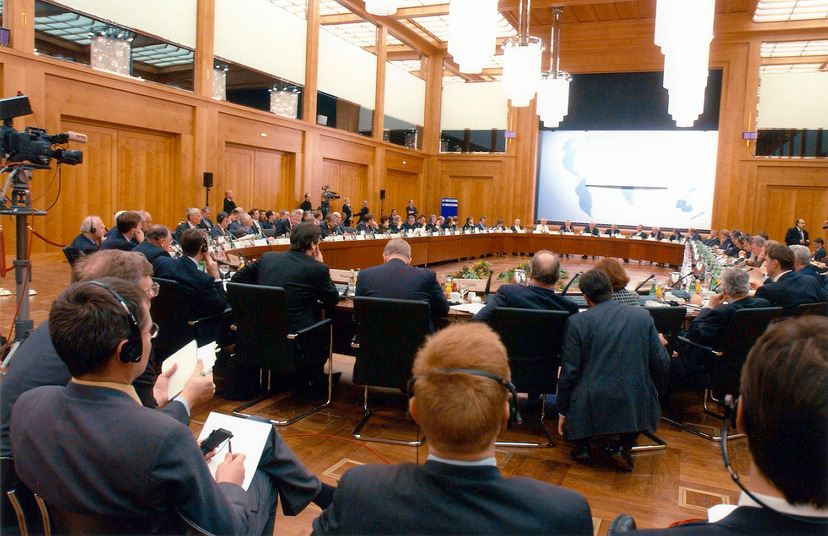Bertelsmann Stiftung workforce tops 300 for the first time
At the end of 2004, the Bertelsmann Stiftung has 312 employees.
1st Salzburg Trilogue
The International Cultural Forums project series has clearly shown that the European continent-with its cultural diversity and by virtue of the political culture's integration efforts—is accorded a key role in the mediation of, dialogue about and tolerance among cultures. Nevertheless, in Europe there no one monolithic understanding of what tolerance is and what its limits are. This presents increasing challenges to the social cohesion of our pluralistic societies. Current discussions about head scarves, European anti-Semitism, discrimination and terror are vivid reminders of these challenges. The key question for culturally diversified and pluralistic societies is how societal consensus can be reached without there necessarily being a shared understanding of values. Tolerance is becoming an increasingly important factor in resolving ethnic, religious, cultural and gender-specific conflicts. Against this backdrop, the Salzburg Trilogue convenes prominent decision-makers and opinion leaders from all over Europe in August 2004 to develop a forward-looking model of tolerance. The participants agree that tolerance is not a static concept, but instead requires proactive involvement of all societal forces to constantly renegotiate how to deal with differences. This is the only way a framework for peaceful coexistence can be erected in a world of accelerating globalization and increasing pluralization. Participants include EU commissioners Pascal Lamy and Sandra Kalniete; Polish Prime Minister Marek Belka; advisor to Morocco's King Mohammed VI, André Azoulay, the Club of Rome president, H.R.H. Prince El Hassan bin Talal; the chair of the supervisory board of BASF AG, Professor Jürgen Strube; the chairman of BP p.l.c., Peter Sutherland; theater director Andrea Breth; and star Russian conductor Valery Gergiev.
2004 Carl Bertelsmann Prize: Improving performance and progress in the public sector
In 2004, the Bertelsmann Stiftung recognizes an organization in the public sector that not only excels in customer orientation and improved efficiency, but also emphasizes a dialogue-based management approach along with an organizational culture that focuses on the individual. From the original long list of 100 organizations in Europe that have been selected and contacted, 41 participate actively in the competition. Of the four finalists nominated, Århus Amt (Århus County, Denmark) is selected as the winner. The Stiftung's prize recognizes an organization that has set itself apart with a high degree of customer orientation and improved efficiency, as well as by cultivating an employee-friendly organizational culture and a dialogue-oriented management style. Given the size of the Amt, this is no easy task. With 21,000 employees, Århus Amt is one of the largest organizations in the running. The regional administration's jurisdiction covers 26 municipalities with a total of 64,000 residents; it has the highest population of all 14 counties in Denmark.
2004 International Bertelsmann Forum: Europe's alternatives – Responsibilities and perspectives of the enlarged European Union
Content

© Marc Darchinger
The International Bertelsmann Forum, January 9–10, 2004, in the Weltsaal at the Foreign Ministry in Berlin.
More than 30 heads of state and government, parliamentary presidents and ministers from 22 European countries, the USA and Israel accept the Bertelsmann Stiftung's invitation to the 2004 International Bertelsmann Forum in Berlin on January 9 and 10, 2004. During their first meeting since the unsuccessful Brussels summit on the EU constitution, they join representatives from business and academia, international organizations and the leading German and international media outlets to discuss the political options for an enlarged Europe. The outcome of this year's forum is the call for a culture of strategic thinking in the EU. This in turn requires purposefully linking the processes of integration and expansion.


